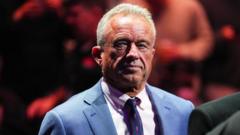RFK Jr, nominated by President-elect Trump, strives to combat ultra-processed foods and reform FDA regulations amid opposition from the food industry, aiming to reshape America’s dietary habits and public health.
RFK Jr’s Bid to Reform America’s Food Industry: Can He Succeed?

RFK Jr’s Bid to Reform America’s Food Industry: Can He Succeed?
Robert F. Kennedy Jr. aims to address the challenges presented by processed foods and additives as he prepares to lead the Department of Health and Human Services.
Robert F. Kennedy Jr., the recently nominated leader of the Department of Health and Human Services (DHHS) under President-elect Trump, is taking an ambitious stance on dietary reform in America. He's focused on eliminating ultra-processed foods and harmful substances like food dyes and additives, a move he believes is crucial for protecting children's health. During a rally, Kennedy expressed grave concerns about food industries "poisoning" the youth, emphasizing the urgency of his mission after having previously stepped back from his independent presidential bid to support Trump.
Kennedy’s proposals to tackle junk food and improve public health are ambitious yet controversial. Notably, he aims to overhaul the regulations governing the food sector, directly challenging the status quo upheld by “Big Food.” Experts, such as Marion Nestle, a former nutrition professor, note the challenges ahead, questioning whether Kennedy will receive the backing needed from Trump to realize his plans.
In advance of his confirmation by the Senate, Kennedy has garnered mixed reactions. While his push to overhaul the FDA has captured some support from both health professionals and lawmakers, others remain skeptical of his history of promoting dubious health claims, such as linking vaccines to autism and asserting that Wi-Fi is cancer-causing.
Kennedy’s campaign slogan, "Make America Healthy Again," encapsulates his aim to eliminate processed foods that contribute to chronic health conditions like obesity and diabetes. His focus has particularly turned to school lunches, addressing the alarming dietary realities faced by children today. As president of the DHHS, he would oversee the FDA, which is tasked with ensuring food safety and health standards, but has faced criticism for being opaque and ineffective.
Pushing for stricter regulations, Kennedy has vowed to eradicate certain food additives and dyes, such as Red No. 3, while calling for the prevention of fluoride in drinking water—a proposal met with concerns regarding potential health repercussions. Critics from the health community have noted that while some of Kennedy’s initiatives may hold merit, others lack adequate scientific backing.
For instance, his assertions about the dangers of seed oils, prevalent in fast food, have been dismissed by experts who emphasize their role in replacing less healthy fats. Kennedy’s outspoken positions place him at odds with existing health policy, leading to skepticism about his ability to effect change within the regulatory frameworks currently in place.
As Kennedy gears up to tackle the food industry, he will face numerous hurdles, notably from an industry accustomed to minimal regulations. Experts emphasize the complexity of enacting meaningful dietary reform, suggesting that while engaging in discussions about reducing processed foods is essential, actual policy implementation may defy simple solutions.
Moreover, any proposed structural changes within the FDA, including gutting its nutrition department, have raised alarms regarding the potential fallout on food safety—concerns echoed by former officials within the agency.
In conclusion, while Kennedy has the potential to drive a serious conversation surrounding America’s diet and public health, many believe his approach might need refinement to align with sound scientific principles and effective regulatory practices. His journey from rhetoric to real change poses a critical challenge that will require a balanced approach to navigate the labyrinth of politics and public health.




















